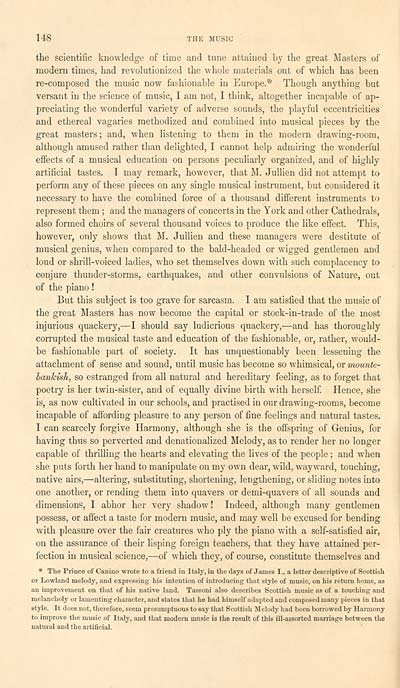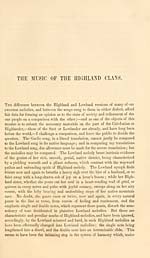Download files
Complete book:
Individual page:
Thumbnail gallery: Grid view | List view

148 THE MUSIC
the scientific knowledge of time and tune attained by the great Masters of
modem times, had revohitiouized the whole materials out of which has been
re-composed the music now fashionable in Europe.* Though anything but
versant in the science of music, I am not, I think, altogether incapable of ap-
preciating the wonderful variety of adverse sounds, the playful eccentricities
and ethereal vagaries methodized and combined into musical pieces by the
great masters; and, when listening to them in the modern drawing-room,
although amused rather than delighted, I cannot help admiring the wonderful
effects of a musical education on persons peculiarly organized, and of highly
artificial tastes. I may remark, however, that M. Jullien did not attempt to
perform any of these pieces on any single musical instrument, but considered it
necessary to have the combined force of a thousand different instruments to
represent them ; and the managers of concerts in the York and other Cathedrals,
also formed choirs of several thousand voices to produce the like effect. This,
however, only shows that M. Jullien and these managers were destitute of
musical genius, when compared to the bald-headed or wigged gentlemen and
loud or shrill-voiced ladies, who set themselves down with such complacency to
conjure thunder-storms, earthquakes, and other convulsions of Nature, out
of the piano !
But this subject is too grave for sarcasm. I am satisfied that the music of
the great Masters has now become the capital or stock-in-trade of the most
injurious quackery, — I should say ludicrious quackery, — and has thoroughly
corrupted the musical taste and education of the fashionable, or, rather, would-
be fashionable part of society. It has unquestionably been lessening the
attachment of sense and sound, until music has become so whimsical, or mounte-
bankùh, so estranged from all natural and hereditary feeling, as to forget that
poetry is her twin-sister, and of equally divine birth with herself. Hence, she
is, as now cultivated hi our schools, and practised in our drawing-rooms, become
incapable of affording pleasure to any person of fine feelings and natural tastes.
I can scarcely forgive Harmony, although she is the offspring of Genius, for
having thus so perverted and denationalized Melody, as to render her no longer
capable of thrilling the hearts and elevating the lives of the people ; and when
she puts forth her hand to manipulate on my own dear, wild, wayward, touching,
native airs, — altering, substituting, shortening, lengthening, or sliding notes into
one another, or rending them into quavers or demi-quavers of all sounds and
dimensions, I abhor her very shadow! Indeed, although many gentlemen
possess, or affect a taste for modern music, and may well be excused for bending
with pleasure over the fair creatures who ply the piano with a self-satisfied air,
on the assurance of their lisping foreign teachers, that they have attained per-
fection in musical science, — of which they, of course, constitute themselves and
* The Prince of Canino wrote to a friend in Italy, in the days of James I., a letter descriptive of Scottish
or Lowland melody, and expressing his intention of introducing that style of music, on his return home, as
an improvement on that of his native land. Tassoni also describes Scottish music as of a touching and
melancholy or lamenting character, and states that he had himself adapted and composed many pieces in that
style. It does not, therefore, seem presumptuous to say that Scottish Melody had been borrowed by Harmony
to improve the music of Italy, and that modern music ia the result of this ill-assorted marriage between the
natural and the artificial.
the scientific knowledge of time and tune attained by the great Masters of
modem times, had revohitiouized the whole materials out of which has been
re-composed the music now fashionable in Europe.* Though anything but
versant in the science of music, I am not, I think, altogether incapable of ap-
preciating the wonderful variety of adverse sounds, the playful eccentricities
and ethereal vagaries methodized and combined into musical pieces by the
great masters; and, when listening to them in the modern drawing-room,
although amused rather than delighted, I cannot help admiring the wonderful
effects of a musical education on persons peculiarly organized, and of highly
artificial tastes. I may remark, however, that M. Jullien did not attempt to
perform any of these pieces on any single musical instrument, but considered it
necessary to have the combined force of a thousand different instruments to
represent them ; and the managers of concerts in the York and other Cathedrals,
also formed choirs of several thousand voices to produce the like effect. This,
however, only shows that M. Jullien and these managers were destitute of
musical genius, when compared to the bald-headed or wigged gentlemen and
loud or shrill-voiced ladies, who set themselves down with such complacency to
conjure thunder-storms, earthquakes, and other convulsions of Nature, out
of the piano !
But this subject is too grave for sarcasm. I am satisfied that the music of
the great Masters has now become the capital or stock-in-trade of the most
injurious quackery, — I should say ludicrious quackery, — and has thoroughly
corrupted the musical taste and education of the fashionable, or, rather, would-
be fashionable part of society. It has unquestionably been lessening the
attachment of sense and sound, until music has become so whimsical, or mounte-
bankùh, so estranged from all natural and hereditary feeling, as to forget that
poetry is her twin-sister, and of equally divine birth with herself. Hence, she
is, as now cultivated hi our schools, and practised in our drawing-rooms, become
incapable of affording pleasure to any person of fine feelings and natural tastes.
I can scarcely forgive Harmony, although she is the offspring of Genius, for
having thus so perverted and denationalized Melody, as to render her no longer
capable of thrilling the hearts and elevating the lives of the people ; and when
she puts forth her hand to manipulate on my own dear, wild, wayward, touching,
native airs, — altering, substituting, shortening, lengthening, or sliding notes into
one another, or rending them into quavers or demi-quavers of all sounds and
dimensions, I abhor her very shadow! Indeed, although many gentlemen
possess, or affect a taste for modern music, and may well be excused for bending
with pleasure over the fair creatures who ply the piano with a self-satisfied air,
on the assurance of their lisping foreign teachers, that they have attained per-
fection in musical science, — of which they, of course, constitute themselves and
* The Prince of Canino wrote to a friend in Italy, in the days of James I., a letter descriptive of Scottish
or Lowland melody, and expressing his intention of introducing that style of music, on his return home, as
an improvement on that of his native land. Tassoni also describes Scottish music as of a touching and
melancholy or lamenting character, and states that he had himself adapted and composed many pieces in that
style. It does not, therefore, seem presumptuous to say that Scottish Melody had been borrowed by Harmony
to improve the music of Italy, and that modern music ia the result of this ill-assorted marriage between the
natural and the artificial.
Set display mode to: Large image | Transcription
Images and transcriptions on this page, including medium image downloads, may be used under the Creative Commons Attribution 4.0 International Licence unless otherwise stated. ![]()
| Early Gaelic Book Collections > Blair Collection > Treatise on the language, poetry, and music of the Highland clans > (160) |
|---|
| Permanent URL | https://digital.nls.uk/76238163 |
|---|
| Description | A selection of books from a collection of more than 500 titles, mostly on religious and literary topics. Also includes some material dealing with other Celtic languages and societies. Collection created towards the end of the 19th century by Lady Evelyn Stewart Murray. |
|---|
| Description | Selected items from five 'Special and Named Printed Collections'. Includes books in Gaelic and other Celtic languages, works about the Gaels, their languages, literature, culture and history. |
|---|

